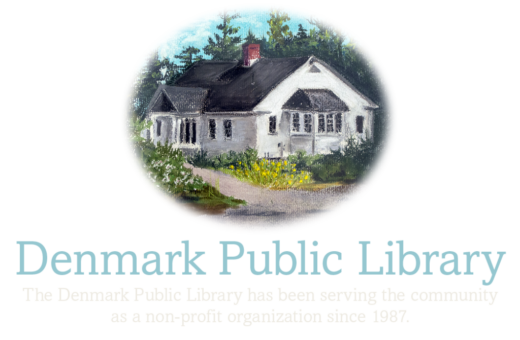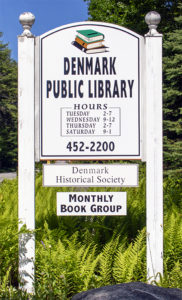COMPUTER USE POLICY
General Policy:
The Denmark Public Library (DPL) provides computer services, including free access to the Internet in accord with its goal to enrich the community by connecting people to the world of ideas, information, and imagination to support their work, education, personal growth, and enjoyment. These electronic resources and services meet the cultural, educational, informational, and recreational needs of the community.
Internet Use Disclaimers:
The Internet is a global computing network that provides access to a wide range of educational, reference and recreational resources, many of which are not available in print. The Internet does not fall under the control or governance of any single agency, government or organization, and therefore the DPL can make no guarantees regarding the accuracy, content, nature or quality of information obtained through the Internet. Further, the DPL does not endorse viewpoints presented on the Internet.
In no event shall the DPL have any liability for damages of any kind arising from its connection to the Internet. Users of the DPL’s computers and Internet access, wireless internet access, including, in the case of minors, their parents or guardians, agree to assume full liability (legal, financial or otherwise) for their actions.
A DPL website home page includes a variety of destinations (links) and search tools. These links have been selected by DPL staff as a service to help the user navigate the internet. Selections are made solely in accordance with expected future utility to DPL users. Selection as a link implies no endorsement by the DPL as to content of a web site, and users must be aware that content of external links may and will change without our knowledge.
Disclosures:
Internet access in the DPL allows access to ideas, information, images and commentary beyond the scope of the DPL’s collections, selection criteria and collection development policy. Some of the Internet material may be controversial. Court decisions over the years have interpreted the DPL to be a “limited public forum” and, as such, the DPL may not discriminate against constitutionally protected content or viewpoints.
Children’s Internet protection Act (CIPA)
The exception to the “limited public forum” doctrine is the Children’s Internet Protection Act (CIPA). Under CIPA it is not acceptable for a minor to receive any material through any website, email, chat room or other direct electronic communication, if it is deemed harmful to minors. The CIPA defines harmful as “any picture, image, graphic image file, or other visual depiction” that, with respect to minors, which:
- taken as a whole, appeals to a prurient interest in nudity, sex, or excretion
- depicts, describes, or represents, in a patently offensive way, an actual or simulated sexual act or sexual conduct, actual or simulated normal or perverted sexual acts, or a lewd exhibition of genitals
- taken as a whole, lacks serious literary, artistic, political, or scientific value.
To offer some safeguards for children, the DPL provides filtered access for individuals using DPL computers. A filter is third-party software that blocks access to certain websites. Parents and guardians should understand that filters limit, but cannot eliminate, a child’s exposure to potentially harmful or undesirable information. Therefore, it is a parent or guardian’s responsibility to monitor and control the internet usage of minor children. The DPL will implement filters that endeavor to identify sites that would not comply with the provisions of CIPA, but will not apply filters to generic word lists or lists of sites not relevant to CIPA.
The DPL’s computers are also subject to access by law enforcement authorities, acting through federal or state law. The DPL will cooperate in the prosecution of violations arising out of use of its computers for illegal purposes and activities.
Guidelines for Use:
Therefore, DPL users may not perform the following actions and DPL staff shall intercede when these policies are violated.
Persons using DPL-supplied public access computers or wireless internet services may not:
- Use these services in a way that violates local, state or federal law. Illegal acts involving DPL resources may be subject to prosecution by local, state or federal officials. Electronic gambling via the DPL’s computers is strictly prohibited by this policy.
- Post, transmit, access, or display obscene and illegal m This includes sending, receiving, or displaying inappropriate materials, defined as text or graphics.
- Use the services for illegal or criminal purpose.
- Use the services to harass or defame others.
- Violate copyright laws or software licensing agreem
- Use sounds or visuals which may be disruptive to others.
- Violate another DPL user’s privacy.
Persons using DPL-supplied public access computers may not:
- Attempt to change any pre-established system
- Install or download any software onto the computer hard drive or the basic input output system.
- Damage computer equipment or software.
Further Guidelines for Use:
- Communication services such as email, instant messaging, and social networking sites are only available as internet services. The DPL does not provide accounts or storage for these services.
- Patrons may save data to preformatted discs, or to their own flash drives. They may not save to the hard drives of DPL com If a working copy of a document is left on a DPL computer, there should be no expectation that that document or file will be available at a future session.
- If a DPL computer user finds a site that is inadvertently and inappropriately blocked by a filter or other technological impediment, the user may report this site to the Librarian. She will endeavor to review this site and determine whether it is actually being actively filtered, and if so, whether it should be and whether to permit temporary or unlimited access.
Security:
The DPL endeavors to protect the privacy and confidentiality of DPL users. Internet users should be advised, however, that because security is technically difficult to achieve, electronic transactions and files could become public.
Please note that the wireless access provided by the DPL is non-secured and potentially subject to monitoring by third parties within range of the building and with the technical capability to do so.
Patrons must be responsible for protecting their privacy and the confidentiality of their information.
Enforcement:
Anyone abusing this policy or the DPL Code of Conduct may be asked to leave the premises.
Approved by the Denmark Library Board of Trustees on April 14, 2022.

